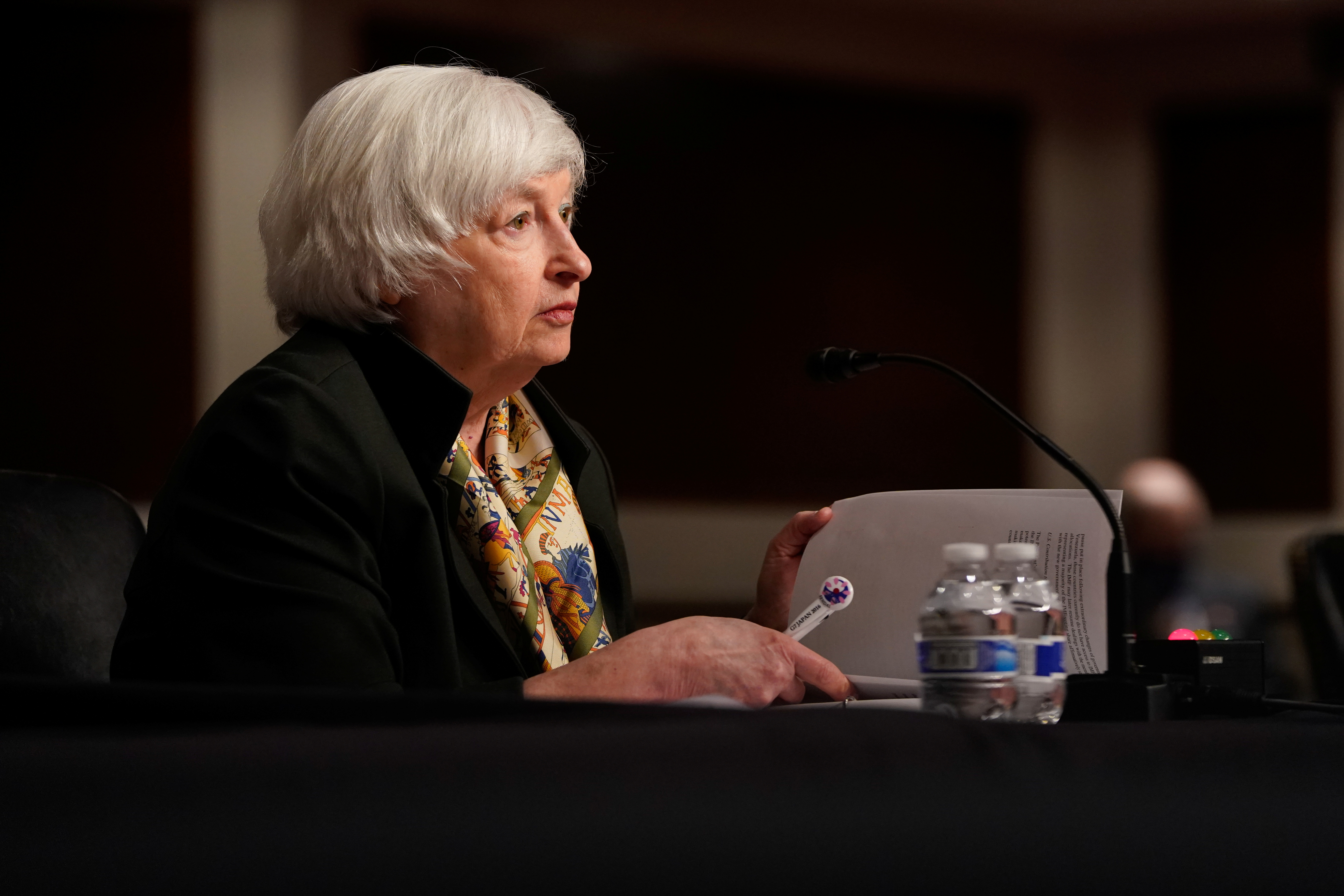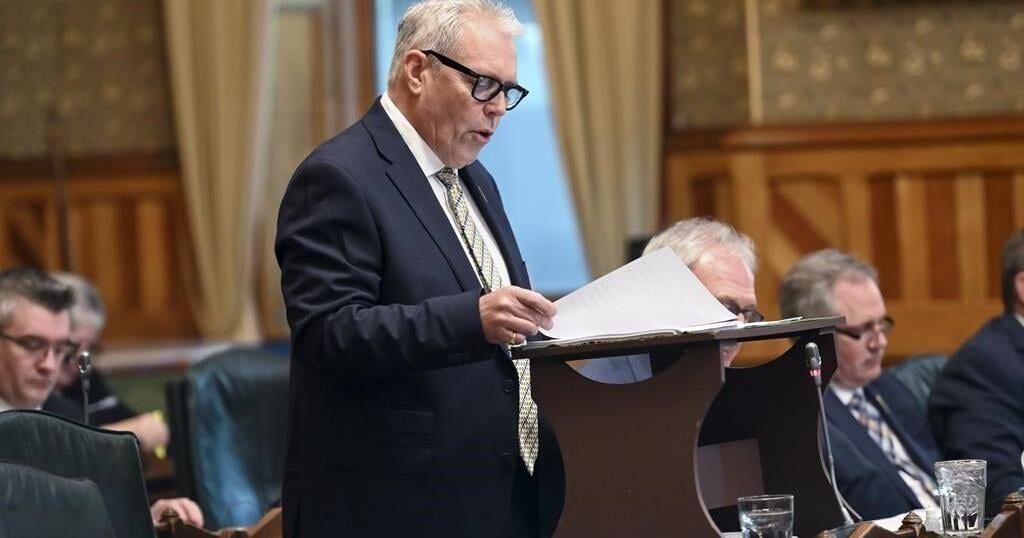Register now for FREE unlimited access to reuters.com
Register
Dec 2 (Reuters) – The Omicron variant of COVID-19 could slow global economic growth by exacerbating supply chain problems and depressing demand, U.S. Treasury Secretary Janet Yellen told the Reuters Next conference on Thursday.
Yellen cited a great deal of uncertainty about the impact of the highly contagious variant, first detected in South Africa, given the severe U.S. economic slowdown caused by the emergence of the Delta variant of COVID-19 earlier this year.
“Hopefully it’s not something that’s going to slow economic growth significantly,” Yellen said, adding, “There’s a lot of uncertainty, but it could cause significant problems. We’re still evaluating that.”
Register
Yellen said the new strain of the coronavirus could exacerbate supply chain problems and boost inflation, but it could also depress demand and cause slower growth, which would ease some of the inflationary pressures.
The spread of Omicron has roiled financial markets and prompted governments around the world to tighten travel and workplace restrictions. The United States reported its first case of community transmission of the new variant on Thursday.
Yellen, the former head of the Federal Reserve, also told the virtual global conference that she is ready to retire the word “transitory” to describe the current state of inflation plaguing the U.S. recovery from the COVID-19 pandemic, echoing comments from Fed Chair Jerome Powell earlier this week.
“I’m ready to retire the word transitory. I can agree that that hasn’t been an apt description of what we’re dealing with,” Yellen said.
Powell told lawmakers this week the word meant different things to different people, sowing some confusion, and it was a good time to explain more clearly what was meant. read more
STRONG ECONOMY

Yellen insisted that stimulus spending by the Biden administration early this year was not the major driver boosting consumer prices, which hit 31-year highs in October and are running at more than twice the Fed’s flexible inflation target of 2% annually. She blamed the surging prices mainly on supply chain issues and a mismatch between supply and demand.
Yellen said the $1.9 trillion American Rescue Plan passed by Congress earlier this year had helped vulnerable Americans get through the worst of the pandemic and fueled the strong U.S. economy.
While it may have contributed to inflation “somewhat,” she said the surge was largely due to the pandemic and the massive shift in consumption towards goods and away from services.
She said the Fed should keep a close eye on rising wages to avoid the kind of damaging and long-lasting “wage-price spiral” seen in the 1970s.
Yellen, who led the Fed from 2014 to 2018, said it was up to the U.S. central bank to decide what to do about interest rates, but noted that a strong U.S. economy, which would likely prompt rate hikes, is generally a good thing for the rest of the world. read more
President Joe Biden’s administration is working closely with the private sector to curb price increases, Yellen said, citing efforts to accelerate the loading of containers at ports and encourage domestic production of semiconductors.
She said lowering Trump-era tariffs on imported goods from China through a revived exclusion process could help ease some inflationary pressures, but would not be a “game-changer.” [nL1N2SN1M6]
While she is “open” to a visit to China to meet with government officials there on economic issues, Yellen said a trip is not currently on her agenda. But she said she would continue to engage with her Chinese counterpart, Vice Premier Liu He, on issues such as technology practices, securities markets and exchange rate practices as well as efforts to rebalance China’s economy toward consumer spending.
Yellen also told the Reuters Next audience that her mind is not yet made up on whether the Fed should create a digital dollar, following China and some other countries in developing central bank digital currencies.
She said the advantages and disadvantages of such a move needed to be weighed, including possible negative effects on the banking system, and that consensus among the Fed, the Biden administration and Congress was needed to proceed. read more
Register
Reporting by Alessandra Galloni, additional reporting by David Lawder, Andrea Shalal and Daniel Burns; Editing by Paul Simao
Our Standards: The Thomson Reuters Trust Principles.

TORONTO – Canada’s main stock index was higher in late-morning trading, helped by strength in energy stocks, while U.S. stock markets also moved up.
The S&P/TSX composite index was up 34.91 points at 23,736.98.
In New York, the Dow Jones industrial average was up 178.05 points at 41,800.13. The S&P 500 index was up 28.38 points at 5,661.47, while the Nasdaq composite was up 133.17 points at 17,725.30.
The Canadian dollar traded for 73.56 cents US compared with 73.57 cents US on Monday.
The November crude oil contract was up 68 cents at US$69.70 per barrel and the October natural gas contract was up three cents at US$2.40 per mmBTU.
The December gold contract was down US$7.80 at US$2,601.10 an ounce and the December copper contract was up a penny at US$4.28 a pound.
This report by The Canadian Press was first published Sept. 17, 2024.
Companies in this story: (TSX:GSPTSE, TSX:CADUSD)
The Canadian Press. All rights reserved.

OTTAWA – Canada’s inflation rate fell to two per cent last month, finally hitting the Bank of Canada’s target after a tumultuous battle with skyrocketing price growth.
The annual inflation rate fell from 2.5 per cent in July to reach the lowest level since February 2021.
Statistics Canada’s consumer price index report on Tuesday attributed the slowdown in part to lower gasoline prices.
Clothing and footwear prices also decreased on a month-over-month basis, marking the first decline in the month of August since 1971 as retailers offered larger discounts to entice shoppers amid slowing demand.
The Bank of Canada’s preferred core measures of inflation, which strip out volatility in prices, also edged down in August.
The marked slowdown in price growth last month was steeper than the 2.1 per cent annual increase forecasters were expecting ahead of Tuesday’s release and will likely spark speculation of a larger interest rate cut next month from the Bank of Canada.
“Inflation remains unthreatening and the Bank of Canada should now focus on trying to stimulate the economy and halting the upward climb in the unemployment rate,” wrote CIBC senior economist Andrew Grantham.
Benjamin Reitzes, managing director of Canadian rates and macro strategist at BMO, said Tuesday’s figures “tilt the scales” slightly in favour of more aggressive cuts, though he noted the Bank of Canada will have one more inflation reading before its October rate announcement.
“If we get another big downside surprise, calls for a 50 basis-point cut will only grow louder,” wrote Reitzes in a client note.
The central bank began rapidly hiking interest rates in March 2022 in response to runaway inflation, which peaked at a whopping 8.1 per cent that summer.
The central bank increased its key lending rate to five per cent and held it at that level until June 2024, when it delivered its first rate cut in four years.
A combination of recovered global supply chains and high interest rates have helped cool price growth in Canada and around the world.
Bank of Canada governor Tiff Macklem recently signalled that the central bank is ready to increase the size of its interest rate cuts, if inflation or the economy slow by more than expected.
Its key lending rate currently stands at 4.25 per cent.
CIBC is forecasting the central bank will cut its key rate by two percentage points between now and the middle of next year.
The U.S. Federal Reserve is also expected on Wednesday to deliver its first interest rate cut in four years.
This report by The Canadian Press was first published Sept. 17, 2024.
The Canadian Press. All rights reserved.

FREDERICTON – New Brunswick‘s finance minister says the province recorded a surplus of $500.8 million for the fiscal year that ended in March.
Ernie Steeves says the amount — more than 10 times higher than the province’s original $40.3-million budget projection for the 2023-24 fiscal year — was largely the result of a strong economy and population growth.
The report of a big surplus comes as the province prepares for an election campaign, which will officially start on Thursday and end with a vote on Oct. 21.
Steeves says growth of the surplus was fed by revenue from the Harmonized Sales Tax and federal money, especially for health-care funding.
Progressive Conservative Premier Blaine Higgs has promised to reduce the HST by two percentage points to 13 per cent if the party is elected to govern next month.
Meanwhile, the province’s net debt, according to the audited consolidated financial statements, has dropped from $12.3 billion in 2022-23 to $11.8 billion in the most recent fiscal year.
Liberal critic René Legacy says having a stronger balance sheet does not eliminate issues in health care, housing and education.
This report by The Canadian Press was first published Sept. 16, 2024.
The Canadian Press. All rights reserved.


Edler to sign one-day contract to retire as a Vancouver Canuck


Billie Jean King set to earn another honor with the Congressional Gold Medal


Account tweaks for young Instagram users ‘minimum’ expected by B.C., David Eby says


Langford, Heim lead Rangers to wild 13-8 win over Blue Jays


Canada’s Hughes may be what International team has been missing at Presidents Cup


Man from Phoenix, Ariz., missing after truck plunges off Yukon bridge


Rogers Communications to buy out Bell’s share of MLSE for $4.7 billion


In the news today: Foreign interference inquiry resumes, Indigenous artist recognized